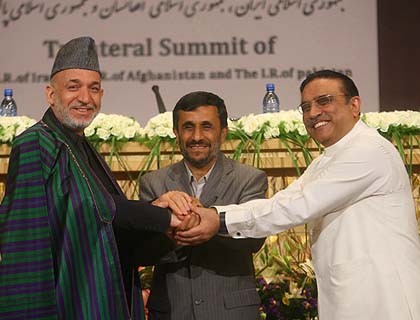The two-day long trilateral meeting among heads of the states of Iran, Pakistan and Afghanistan, Mahmoud Ahmadinejad, Asif Ali Zardari and Hamid Karzai ended and they took part in a joint news conference late Friday, February 17, 2012. The discussion generally circulated around peace and stability in the region and tightening economic and trade relationship between three countries.
All equally expressed their resolve to work collectively and do not let foreign pressures to affect their friendly relationship, which is explicitly hinting to current mounting western and global pressure against Islamic Republic of Iran over its controversial nuclear program.
President Mahmoud Ahmadinejad strongly criticized countries with imperial design, while his Afghan and Pakistani fellows kept silence though having deep and lasting relation with the United States. Officials of both Islamabad and Kabul clearly stated that they would strongly condemn any attack against Tehran.
Afghanistan largely depends on the two bigger neighboring countries and it is hardly possible to ignore both in its future diplomatic relation with any countries. And both Tehran and Islamabad have deep-rooted influence over cultural, political and economic issues.
The religious, lingual and cultural similarities have made them key players over several past decades. And even during past ten years, when Kabul enjoys quite appreciating relation and global sympathy, Afghan officials never dared to go against neighbors over issues ostensibly they were blamed for.
Several times, neighbors halted the transportation of fuels and other goods of Afghan entrepreneurs and caused problems in the country, but finally these were Afghan officials to go and ask for the release of truck loads and cargos.
In the issue of signing strategic cooperation with the United States, reportedly both neighbors utilized their influence to mount pressure in order to thwart the possible contract. Afghan officials vividly talked about expressed concerns in meetings with Tehran and Islamabad officials.
In response, Kabul always insured them that it would not allow any country to use its soil as threat against any country in the world, particularly our neighbors. But could such promises and commitments relieve neighbors is the question that needs to be talked over, because they harbor suspicion over the sustainability of government after completion of foreign military withdrawal in 2014.
Presently, even Taliban militants do not accept President Karzai's administration authorized to negotiate with it over current security deadlock. Recently, when President Karzai said that trilateral negotiation was started among Taliban, US and Afghan government, Taliban showed no hesitation to reject the claim, saying it did not negotiate with Afghan government. The statement of Zabihullah Mojaheed was frank and resentful, which was clearly found degrading for Karzai's administration.
Putting the statements of Taliban spokesman aligned with its lasting position against Afghan government has consequential reflections. It has been a long time that Kabul government struggle to reach out Taliban-led insurgency.
Indeed, the diplomatic door was first knocked by President as he was increasingly disappointed of absolute success of military approach. He summoned a grand Jirga in 2010 and got the approval of participants claimed to represent all walks of the society to push for a peace plan.
Subsequently, he established a High Peace Council and authorized it to reach out Taliban leadership and negotiate with them to find a solution to security crisis and instability. But the step was not welcomed by Taliban at all.
Since the very start of the process, it warned to target members of High Peace Council and other Afghan officials. Except some elements joined the process, which also cannot be of any advantage for the entire diplomatic efforts, because during past years too there were reports of some small groups of insurgency joining the so-called democratic process, the entire result of Afghan government peace initiative.
During the process, numbers of Taliban prisoners were released as sign of goodwill to instigate Taliban leaders to come to negotiating table. The names of some Taliban leaders were removed from blacklist, but all those warming steps could never penetrate into hearts of Taliban leadership.
The position of Taliban remained unchanged, and even there were reports that released prisoners joined militants again and launch attacks against Afghan foreign forces. The process came to stoppage after Chief of the High Peace Council was assassinated by an insurgent who claimed to be the representative of Taliban in his very house.
Right after the incident, President Karzai emotionally blamed Pakistan for the failure and said instead of Taliban his government should have talked with Islamabad officials, the remark which still cast shadow over bilateral relation.
Though his remarks were modified subsequently, and also efforts made to keep the situation under the control, but he doubts about Islamabad's true intention.
One of his main aims in the trilateral meeting in Islamabad this week was to enlist the support of civil and military officials to pave the way for his government to be engaged in direct peace talks with Taliban militants, the thing which irritated Islamabad. Pakistani Foreign Minister, Ms. Hina Rabbani Khar said that it was preposterous for Afghanistan to demand to deliver the Taliban leadership to the negotiating table. "If that is the expectation, there is no reality check", she added.
It seems Mr. President is really worried about the marginalization of his administration. Taliban have always emphasized that it would not talk with Kabul government because it is not authorized.
He hoped desperately that Pakistan might cooperate over the issue, but the reaction of foreign minister showed the sensitivity of Islamabad over conception that it has full control over the movements of Taliban and other militants. It is not known what would be the next step to be engaged in peace process.

